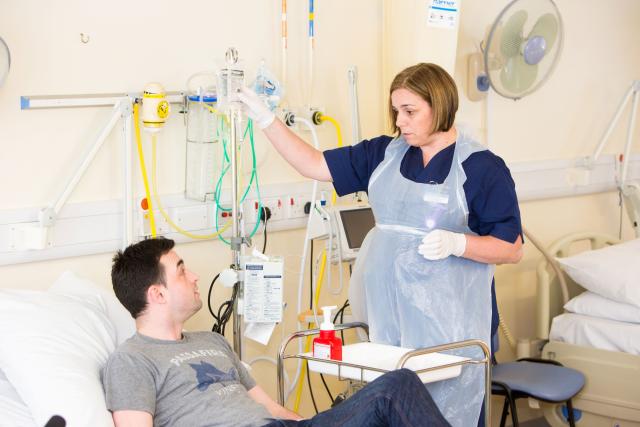
How Welsh researchers are leading the fight against cancer
1 May
Dr Nicola Williams, National Director of Support and Delivery at Health and Care Research Wales, recently spoke to BBC Radio Wales Science Cafe about some of the amazing cancer research we are supporting in Wales.
Listen again to the interview and read more on how Welsh research is making a difference in the fight against cancer.
One of the world's largest prostate cancer studies
Since British Olympic hero Sir Chris Hoy announced that he had been diagnosed with terminal, stage four prostate cancer, there has been an upsurge in NHS searches for symptoms.
Prostate cancer is the most common male cancer in Wales, accounting for over a quarter of all new male cancer diagnoses.
Health and Care Research Wales is proud to be funding one of the world’s largest surgical studies into prostate cancer. ELIPSE (Evaluation of Lymphadenectomy In High Risk Prostate Cancer Surgery) is comparing two different types of surgery for men with prostate cancer that has not yet spread to other parts of the body, but is at risk of doing so: removal of the prostate and lymph nodes, to removal of the prostate alone.
The results will provide clinicians and patients with important evidence which will inform the best approach for treatment.
Stopping the spread of breast cancer
The most common cancer in women in Wales is breast cancer, with over 2000 diagnoses each year. While treatment can be successful, especially if identified early, in around 5% of women breast cancer has already spread to other parts of the body by the time it is diagnosed. At a more advanced stage, breast cancer patients may only have a few treatment options available to them.
Dr Naledi Formosa, a Research Fellow of Cancer and Genetics Cancer at Cardiff University and a member of the Health and Care Research Wales Faculty, is using an innovative 3D model of the lungs to investigate how and why the disease spreads, and whether any new therapies may be able to stop it from doing so. Dr Formosa said,
“The lung model will imitate what occurs in the body when breast cancer spreads into healthy lung tissues, so that I can examine how breast cancer travels to other body parts and the factors leading to the spread. Hopefully we can identify if there's a new therapy or drug to prevent breast cancer from spreading, or even reverse it.”
Innovative bowel cancer imaging
Bowel cancer is the fourth most common cancer in Wales, but the second-biggest killer. However, when diagnosed early, survival rates are high: nine in 10 people diagnosed at the earliest stage will survive.
Evidence shows there is a 90% cure rate for cancer detected through bowel screening. This is usually in the form of a colonoscopy, a hospital procedure which can be invasive and uncomfortable for patients. Cardiff University’s Centre for Trials Research, funded by Health and Care Research Wales, is working with partners from across the UK on a major study to evaluate innovative new technology to make imaging easier and improve bowel cancer diagnosis.
The ColoCap study will evaluate the use of an easy-to-swallow “camera in a capsule”. Once swallowed, it travels through the stomach, small intestine and large bowel, photographing the inner lining. Images are sent to a recorder worn by the patient, downloaded and reviewed remotely by a consultant, and the capsule passes naturally out of the body. It could prove to be an accurate, cost-effective solution which eases pressure on hospitals and improves uptake and accessibility of colorectal diagnostics.
Increasing access to trials
Lastly, a global biotechnology company is boosting Wales’ clinical trial infrastructure as part of efforts to broaden access to clinical trials.
Health and Care Research Wales’ collaboration with BioNTech, the company behind the world’s first approved mRNA-based COVID-19 vaccine, aims to allow more patients to access studies into investigational cancer treatments.
BioNTech is currently sponsoring a trial into personalised cancer vaccines for colorectal cancer patients at Velindre Cancer Centre in Cardiff. A separate study on head and neck cancer has also recently opened.
Fighting cancer with research
From a UK-wide project to improve bowel cancer diagnosis to work funded by our Faculty to tackle the spread of breast cancer, our research aims to improve diagnosis rates, inform treatment options and ultimately increase survival rates.
Dr Nicola Williams said, “We are proud of the role Welsh researchers are playing in the ongoing fight against cancer, here in Wales and on a global scale. Every cancer diagnosis is a devastating one, but through research we can inform screening, diagnosis and treatment, empower patients and improve survival rates.”
Find out more about our cancer research through the Wales Cancer Research Centre.